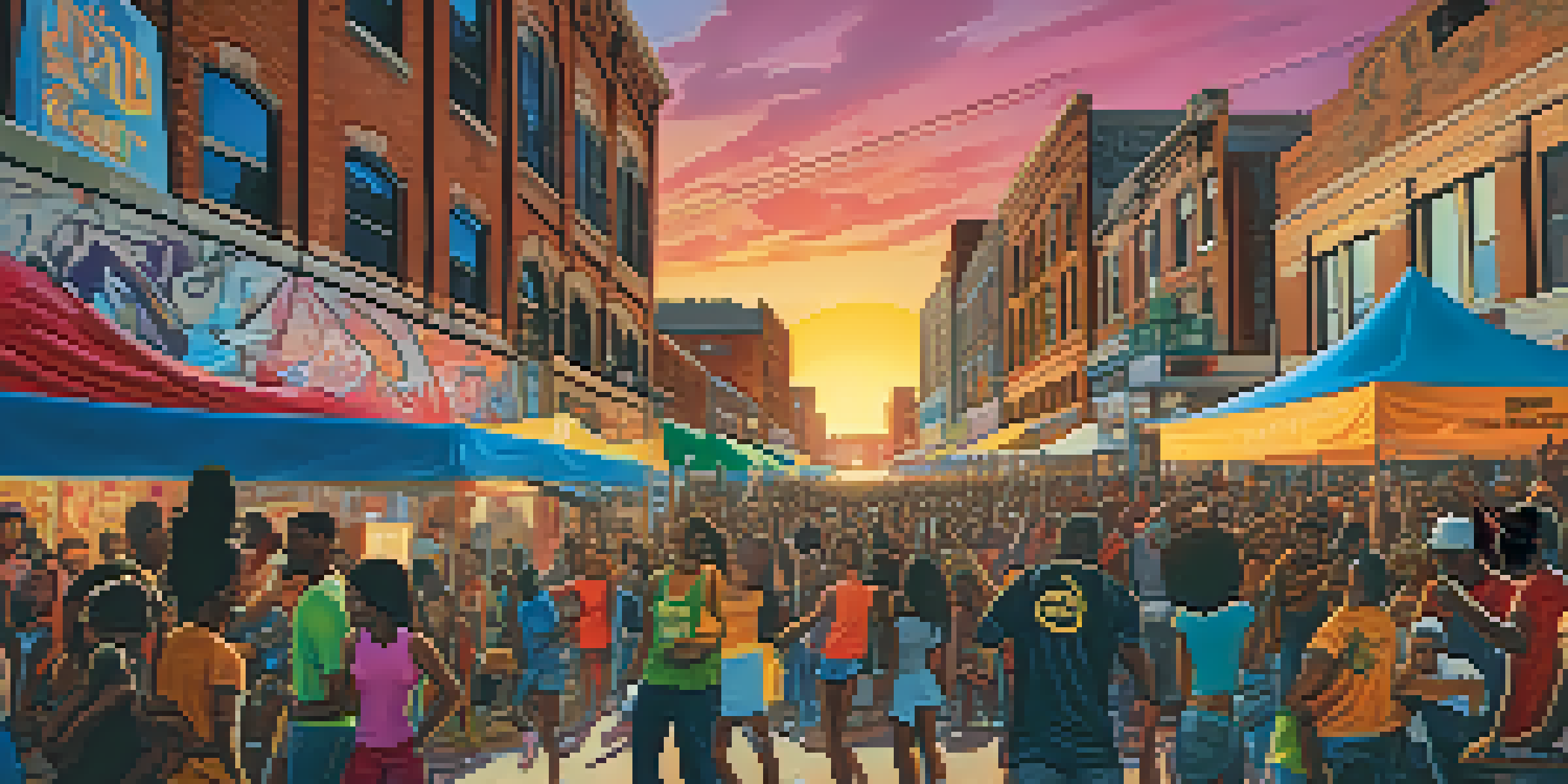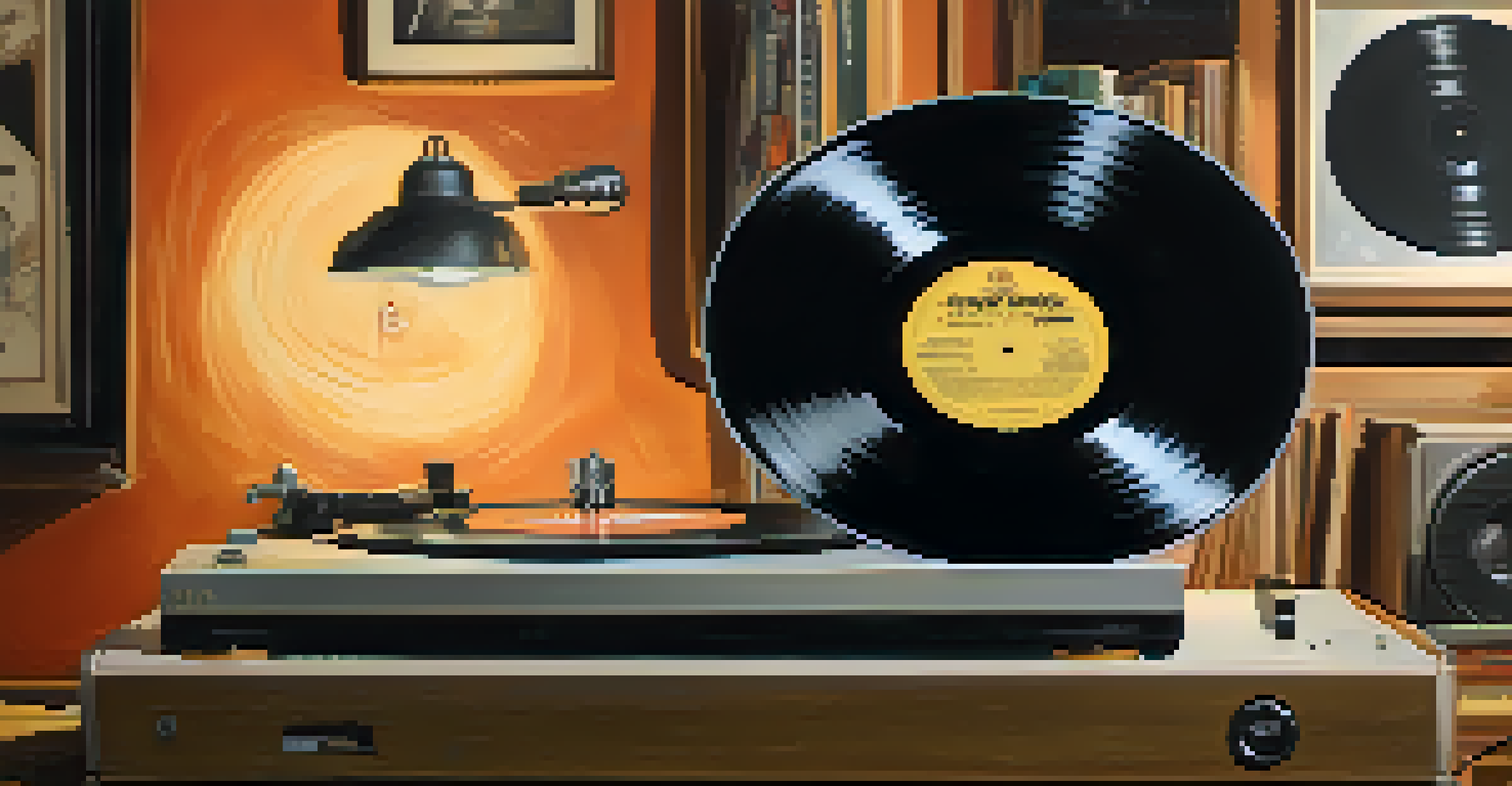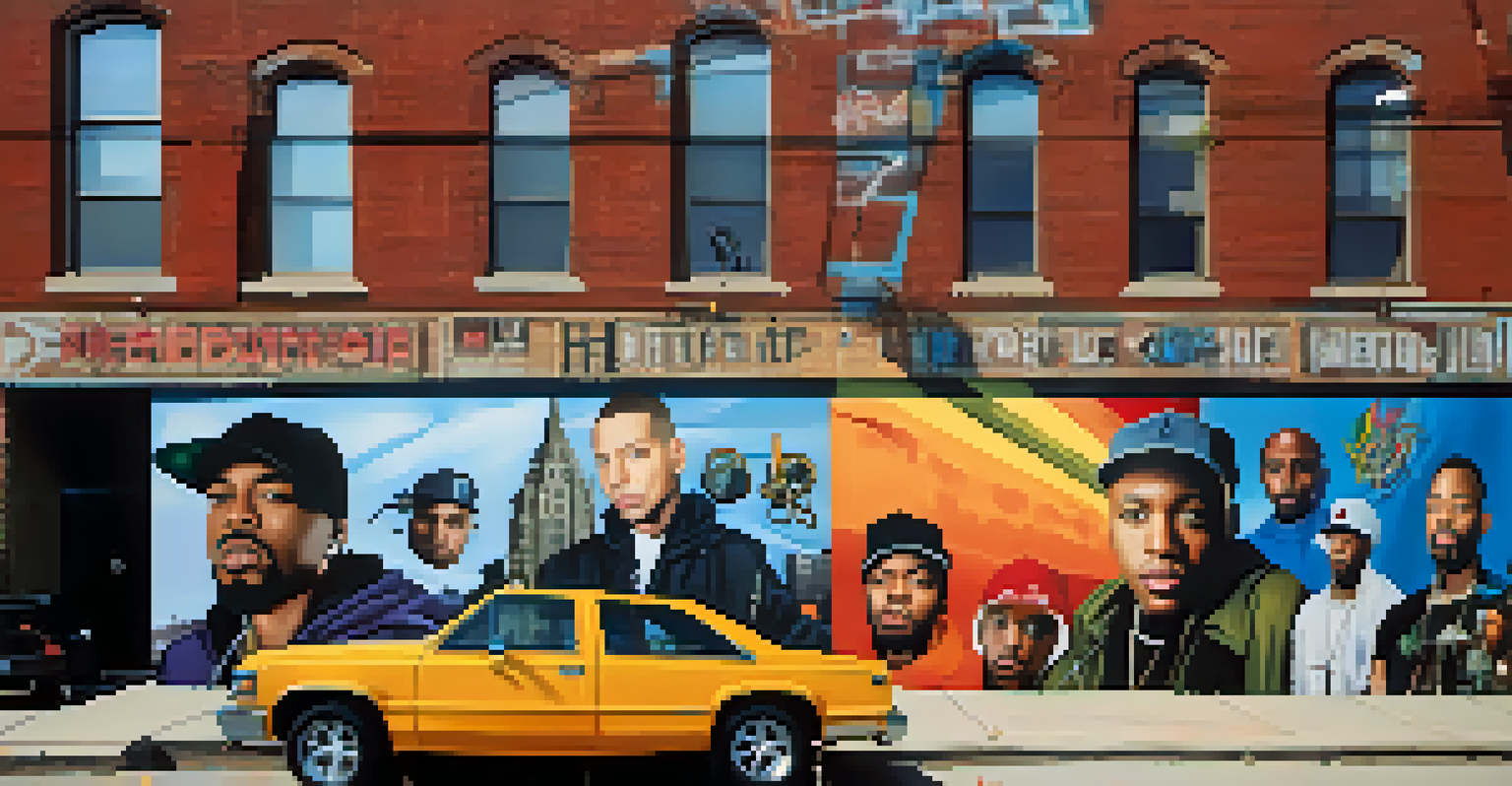Detroit's Influence on Hip-Hop: From Local to Global

The Roots of Hip-Hop in Detroit's Vibrant Scene
Detroit's hip-hop scene is deeply rooted in the city's rich musical heritage, blending genres from Motown to jazz. This unique cultural mix has given rise to a distinct sound that resonates with both local and global audiences. The passion of Detroit's artists reflects the city's resilience and creativity, serving as a backdrop for unforgettable lyricism and innovative beats.
Detroit is a city of great resilience and creativity, and hip-hop is a powerful reflection of that spirit.
In the 1980s and 1990s, Detroit became a breeding ground for talent, with iconic figures like J Dilla and Eminem emerging from its neighborhoods. Their influence not only shaped the local scene but also transformed the hip-hop landscape worldwide. This era laid the groundwork for future generations, proving that Detroit could compete on a global stage.
With its gritty storytelling and authentic expression, Detroit hip-hop draws listeners into the city's narrative. This connection to place is a powerful aspect of the genre, allowing artists to convey their experiences and emotions through their music. The sense of community and shared history in Detroit's scene creates a vibrant atmosphere that continues to inspire.
Key Artists Who Shaped Detroit's Hip-Hop Identity
Prominent artists like Eminem, Big Sean, and Royce da 5'9'' have played pivotal roles in defining Detroit's hip-hop identity. Eminem's rise to fame marked a turning point, bringing national attention to the city and inspiring countless aspiring rappers. His raw storytelling and unique style showcased Detroit's grit and determination, setting a benchmark for authenticity in the genre.

Similarly, Big Sean's smooth flow and catchy hooks helped bring a fresh perspective to Detroit's sound. His collaboration with local artists and producers has further solidified the city's status as a hip-hop hub. These artists not only elevate Detroit's profile but also foster a sense of pride among local communities.
Detroit's Rich Musical Heritage
Detroit's hip-hop scene blends genres from Motown to jazz, creating a unique sound that resonates with both local and global audiences.
In addition to these stars, underground artists like Danny Brown have contributed to the diversity of Detroit's hip-hop scene. Their willingness to experiment with sound and style challenges conventional norms, paving the way for innovation. As a result, Detroit has become synonymous with artistic freedom and experimentation.
The Impact of Detroit's Sound on the Broader Genre
Detroit's unique sound, often characterized by a blend of samples and live instrumentation, has left an indelible mark on hip-hop as a whole. The influence of local producers like J Dilla and his signature 'slum sound' has inspired countless artists beyond the city. This distinct approach to music production emphasizes creativity and emotional depth, setting a standard that many strive to achieve.
Music is a universal language and hip-hop is the voice of the streets, telling the stories of those who live there.
Moreover, the collaborative spirit within Detroit's hip-hop scene encourages artists to push boundaries and explore new directions. This ethos has resonated with producers and musicians across the globe, fostering an environment where innovation thrives. As Detroit's sound continues to evolve, it inspires others to find their unique voices in the ever-changing landscape of hip-hop.
The city's dedication to authenticity ensures that its contributions to hip-hop remain relevant and impactful. By staying true to their roots while embracing change, Detroit artists keep the genre fresh and exciting. This ability to balance tradition and innovation is a testament to the city's enduring influence on hip-hop culture.
The Role of Detroit's Clubs and Venues in Hip-Hop Culture
Detroit's clubs and venues have long served as incubators for hip-hop talent, providing a space for artists to showcase their skills. Iconic spots like The Shelter and St. Andrew's Hall have hosted countless performances, helping to launch the careers of many local artists. These venues foster a sense of community, where fans and creators come together to celebrate music and culture.
Moreover, open mic nights and local showcases play a crucial role in nurturing emerging talent. They offer artists the chance to connect with audiences, hone their craft, and gain exposure. This grassroots approach to promoting hip-hop ensures that fresh voices continue to emerge from the city, enriching the scene with diverse perspectives.
Influential Artists Shape Identity
Prominent figures like Eminem and Big Sean have defined Detroit's hip-hop identity, elevating the city's profile and inspiring local communities.
The vibrant nightlife in Detroit also contributes to the city's hip-hop identity, with events that blend music, art, and culture. This fusion creates a dynamic atmosphere that attracts both locals and visitors, further establishing Detroit as a hip-hop destination. The energy of these gatherings fosters collaboration and creativity, keeping the spirit of Detroit's hip-hop alive.
The Influence of Detroit's History on Hip-Hop Lyrics
The historical context of Detroit, marked by economic decline and social change, has profoundly influenced hip-hop lyrics emerging from the city. Artists often draw upon their personal experiences and the struggles faced by their communities, creating a narrative that resonates on a universal level. This storytelling aspect connects listeners to the real-life challenges and triumphs of the artists, adding depth to their music.
Furthermore, the legacy of the civil rights movement and Motown's cultural impact has shaped the themes explored in Detroit hip-hop. Artists weave in messages of empowerment, resilience, and social justice, reflecting the city's ongoing fight for equality. This rich tapestry of history not only enriches their music but also elevates the genre as a whole.
As Detroit hip-hop continues to evolve, the influence of the city's history remains a powerful force. New generations of artists are inspired by the past while forging their own paths, ensuring that the narrative of Detroit's struggles and successes continues to be told. This connection to history is what makes Detroit hip-hop both unique and timeless.
Collaborations and Cross-Genre Influences in Detroit
Detroit's hip-hop scene is marked by collaborations that bridge genres, creating a unique sound that reflects the city's diverse musical landscape. Artists often collaborate with musicians from other genres, such as R&B, rock, and electronic music, resulting in innovative and genre-defying tracks. This willingness to experiment has led to some of the most memorable moments in contemporary hip-hop.
For instance, collaborations between hip-hop artists and Detroit's legendary rock musicians have produced unforgettable tracks that resonate with fans across the spectrum. These cross-genre partnerships not only highlight Detroit's rich musical heritage but also showcase the city's ability to adapt and thrive in a rapidly changing industry. Such collaborations continue to push the boundaries of hip-hop, proving that creativity knows no limits.
Community-Centric Hip-Hop Festivals
Detroit's hip-hop festivals celebrate local talent and foster community engagement, reinforcing the city's status as a cultural hub.
As a result of this collaborative spirit, Detroit has become a melting pot of sounds and styles, attracting artists from around the world. This vibrant exchange of ideas fosters an environment of innovation and encourages artists to explore new directions. By embracing diversity, Detroit's hip-hop scene remains fresh and relevant, influencing the genre on a global scale.
Detroit's Hip-Hop Festivals: Celebrating Culture and Community
Detroit's hip-hop festivals, such as the Detroit Music Festival and Movement, play a vital role in celebrating the city's rich culture and community. These events showcase local talent alongside international acts, highlighting the diversity and creativity that defines Detroit's hip-hop scene. They provide a platform for artists to connect with fans and each other, fostering a sense of unity and pride.
Moreover, these festivals often include workshops, panels, and discussions that promote education and collaboration within the hip-hop community. By sharing knowledge and experiences, artists can grow and learn from one another, strengthening the bonds within the scene. This commitment to community engagement ensures that Detroit's hip-hop remains vibrant and inclusive.

As these festivals continue to gain popularity, they attract visitors from around the globe, further establishing Detroit as a cultural hub. The energy and excitement generated by these events contribute to the city's reputation as a destination for hip-hop lovers. Ultimately, these celebrations reinforce the importance of community and creativity in shaping Detroit's hip-hop legacy.